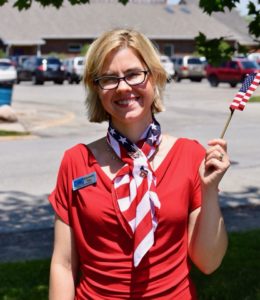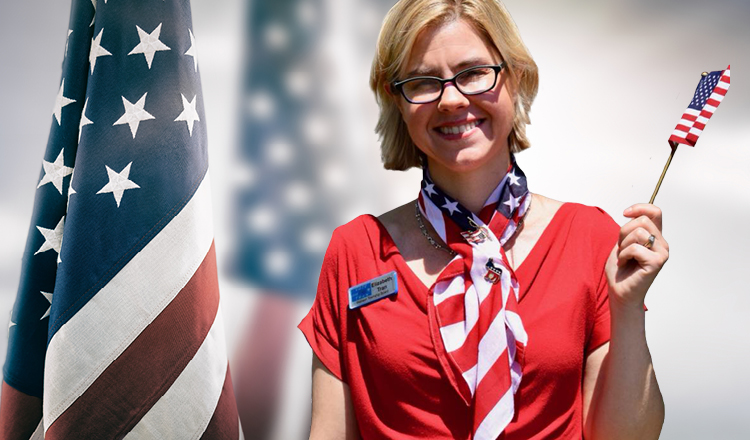Biochemistry professor Elizabeth Tran: “I finally realized that I needed to stop waiting for someone else to fix things”
In 2018, a record number of women across the United States ran for — and won — political office, including two professors from Purdue’s West Lafayette campus.
Elizabeth Tran, associate professor of biochemistry and director of the biochemistry graduate program, was elected to the Wabash Township Advisory Board in West Lafayette. Tran earned her PhD in biochemistry at North Carolina State University and joined the Purdue faculty in 2009. We asked her about her decision to run, increasing the number of women in office, and what she hopes to accomplish on the Wabash Township board.
To start, tell us about how you decided to run for office. Was this something you planned or hoped to do?
I never pictured myself running for office. However, I have always been outspoken when it seems that something is unfair or harmful to other people.
As a mother of a mixed race teenage daughter, I have become increasingly worried about the state of our community and our country. I don’t want her to live in a world where she is judged by her looks over her mind, by her body size over the size of her heart.
I had complained endlessly about the injustices and unfairness in the system to many of my friends and colleagues until I finally realized that I needed to stop waiting for someone else to fix things and start fixing things myself. Because I have a very time-consuming position at Purdue, I decided to start small with a township board position.
How did your background with Purdue prepare you for public office?

I am a problem solver, by nature. I am a biochemist by training and I oversee an NIH-funded research laboratory that investigates defective genes and links to cancer. The skills needed to conduct research, to be able to identify a problem, formulate a hypothesis, and construct a solution, are not so different than what our politicians do — or should do. The most important skills that I’ve gained working at Purdue are managing people and working within a large institutional system.
How did you find campaigning? What surprised you, and what kept you going?
Campaigning means a lot of different things today. Campaigning includes canvassing (going door to door); advertising through mail, social media, or TV; communicating with potential voters through social media and e-newsletters. What surprised me was the diversity of media types needed to reach a diverse population of voters. Certain groups only read postal mail while others use Facebook or Twitter exclusively.
What I enjoyed the most was all the positive comments. It was amazing to have people say “Good for you for running!” or “It’s just wonderful that a Purdue professor is running for office.” That kept me going.
Polling shows that men are about twice as likely to consider running for office than women. Why do you think that is — and how do we change that?
Women are underrepresented in leadership positions across multiple professions. There are likely multiple factors in play here, but having a leadership whose race, sex, gender identity, socioeconomic status, and religious views mirror our community would decrease bias and encourage others to picture themselves in those positions.
One could imagine that this is also a pipeline problem, whereby more men may hold positions of leadership in other professions which they can use as evidence of experience.
What are your thoughts as a record number of women ran for and were elected to office in 2018, but still only made up 25 percent of Congressional candidates?
There has been a very vocal and powerful trend of women speaking out since the last presidential election on a variety of injustices. The surge in female candidates is a reflection of that and I hope to see the trend continue for the 2020 election. The most important social advances are made with small steps so I do expect to see an increase in the future.
What do you hope to accomplish while you’re in office?
My charge as a township board member is to oversee the township budget. Historically, Wabash Township has given a disproportionately low percentage of its funds for poverty assistance compared to other townships in Indiana. While the area around Purdue may seem quite affluent, we do have people living in poverty in our community. My goal is to determine why so little assistance has been given out and to make sure that the application forms are accessible and easy to complete and return. I also hope to make the budget available on the web so that everyone can see how our funds are spent without having to attend the budget meeting itself.
What words of wisdom do you have for people who are wanting to have an impact on their community — whether in elected office or other avenues?
If people want to make a difference in the community, they should choose an area that matches their passions and then get involved. The strongest communities are the ones where members are highly involved in helping others that are less fortunate. The more helping hands you have, the more people you can help up.
Purdue Women have been taking giant leaps for 150 years, and 2019 is no exception.
Learn how the Purdue Women’s Network is having an impact.
The Purdue Women’s Network creates an alumnae sisterhood that motivates, inspires, uplifts, and connects Purdue alumnae now and for life. For good.
About the Purdue Alumni Association
Founded in 1878, the Purdue Alumni Association harnesses the power of 630,000 alumni and a world-class institution to enrich the personal, professional, and intellectual lives of alumni and students and advance the University’s mission. It provides endless opportunities through its programs, services, and resources to keep the University a strong, vital part of alumni’s lives, regardless of where they are in the world, and to foster lifelong learning.

